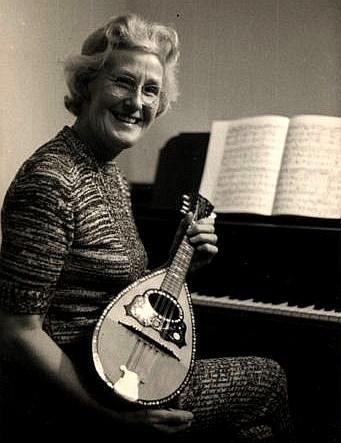Also in 1947 she married the diplomat and civil servant, Richard Hercules Wingfield Pakenham CBE. Eileen’s parents had moved to Harpenden and she and her husband moved to live with them in 1957 at 25 Rothampsted Avenue. In the mid 1970s, after both parents had died, they moved to a smaller property at 9 Kirkwick Avenue.
Eileen had two sons, Richard and John, and when the boys started playing guitar she bought a mandolin from the Luton Music Shop, run by Philip J. Bone. She became friendly with the owner’s daughter, Irene, who also played the mandolin and in 1978 they both joined the London Mandolin Ensemble for which Eileen composed several mandolin orchestral works.
As a composer she always remained an amateur, never formally copyrighting her work, but she received much acclaim both locally and internationally as a composer for the mandolin.
Her works have been used for examination pieces in Music Schools and performed by groups around the globe from Japan to the USA. She was even mentioned by Alfred Einstein in his book ‘Greatness in Music’.
Eileen’s music is quite distinctive in style - typically English of the 1930s, sometimes coloured by the broad, landscape sweep of Vaughan Williams, the humour of Walton’s Facade, or conjuring up a mental image of Miss Joan Hunter-Dunn, but always with a flavour that is distinctly Eileen Pakenham.
Taken from an article by Andy Boden.


 RSS Feed
RSS Feed